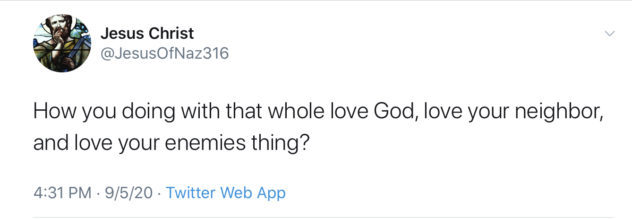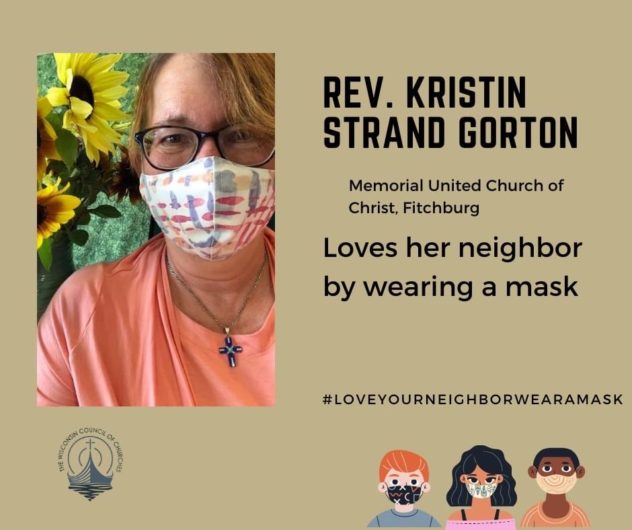You can watch the video of Pastor Kris’ reflection, Love Summed Up, HERE.
I have a question for you this morning. How would you sum up what “love” is?
In response, you could turn to the Golden Rule. It is summed up in our faith tradition with Jesus’ words to “Do to others as you would have them do to you” (Luke 6:31). There is a poster in the Youth Room at church, which offers the Golden Rule[1] through the words of Jesus and12 other faith traditions. Here are just a few:
- From Judaism we hear, “What is hateful to you, do not do to your neighbor. This is the whole Torah; all the rest is commentary,” Hillel, Talmud, Shabbat 31a
- In Islam, “Not one of you truly believes until you wish for others what you wish for yourself,” The Prophet Muhammad, from the Hadith
- From Buddhism, “Treat not others in ways that you yourself would find hurtful,” Udana-Varga 5:18
- And from Hinduism, “This is the sum of duty: do not do to others what would cause pain if done to you,” Mahabharata 5:1517
Do unto others. Love your neighbor. Inflict no suffering.
The words we have in the letter from Paul today sounds a lot like Jesus. “Love one another… Love your neighbor as yourself… Love does no wrong to a neighbor; therefore, love is the fulfilling of the law” (Romans 13: 8-10).
This is our prime directive. The one thing we are to do as people of God. Love. What can be easier than that?
Because love is easy. Right?
How is that going for us today? In 2020?
THOSE questions are just packed. Yet the commandment is very specific. And repeated. By Jesus. By Paul. By other faith traditions. Emphasized with a sense of urgency through the prophets of Hebrew Scripture, and by Paul: “You know what time it is… NOW is the moment…” NOW is the time to love our neighbor. Not sometime in the future, but now. Now—are we alert to the challenges around us?
Or, in the midst of a pandemic, with tensions in our country dangerously high, is the idea of loving all, our neighbors… our enemies… too much of a Kumbaya fantasy? Do any of you remember that old church campfire song, sung at night as kids and counselors made s’mores with chocolate candy bars, roasted marshmallows, and graham crackers—Come by me God… Kumbaya? Are we seeking our own safety and comfort, more than a love for our neighbors?
Have we become stretched too thin, too torn apart, by the rhetoric, lies, and social media trolls? In our cities, in response to racial injustices… how do we understand what we are witnessing? Are we seeing peaceful protests to change systems? Love embodied? Or, do we only see riots? In the looting and arson, is it local people committing crimes, or outside thugs coming in to stir up trouble? How are our systems—healthcare, education, policing, incarceration, voting—set up to continue the oppression of people who are Black, indigenous, of color? Are the conflicts emerging out of a positive regard for life? Or a disregard for property? Should we be afraid of the far left? Or is it the far right? What about people who are in-between the extremes? Are they just complicit?
Seeped in the binary structures of “this,” or “that,” is there another way for us to respond to the world for those of us who follow Jesus? On Twitter a few weeks ago Dr. Michael Svigel wrote, “Theology 101: The question should never be, ‘Is this action leftist or right-wing… liberal or conservative… socialist or capitalist?’ The question should be, ‘Does this action love my neighbor… look out for their interests more than my own… manifest the fruit of the Spirit?”[2]

Does this action love my neighbor… (and) look out for their interests more than my own?
During the pandemic, the ever-urgent need to look out for the interest of our neighbor has become even more imperative. How are we to live into God’s call for love over fear and care for one another in these difficult times?
I have become interested in the emerging practices which cross faith and secular boundaries. In the new realities of our lives, handwashing, wearing a mask, social distancing, and using technology to keep in touch with one another can be seen as more than just keeping us physically healthy. What if we were to recognize these actions as intentional, positive moments of showing how we love our neighbors?
Last Sunday, during our time of prayer, I mentioned how we can intentionally use the 20 seconds as we wash our hands to think of the ways in which we are connected to our global community. Billions of people are taking part in this simple daily ritual. Kamau Ayubbi of the Department of Spiritual Care, Michigan Medicine, suggests “we can embrace the act of handwashing as something more than something we do for physical health… The idea is this: that a small and necessary task done collectively with intention will contribute to a healthier social and emotional environment. Kindness and Compassion to self and others make a challenging situation bearable and meaningful and opens us up to creative ways to find health during stressful and challenging times” (FaceBook post May, 2020).
 At the beginning of our reflection, I referred to the fact faith communities around the world share the principle we frequently refer to as the Golden Rule, “Do to others as you would have them do to you” (Luke 6:31). The Wisconsin Council of Churches has been encouraging people to post a picture of themselves wearing a mask with the hashtag “Love your neighbor, wear a mask.” This is an act we can do to show our love and respect for others in our community. Here is the photo the Council posted of me wearing my mask.
At the beginning of our reflection, I referred to the fact faith communities around the world share the principle we frequently refer to as the Golden Rule, “Do to others as you would have them do to you” (Luke 6:31). The Wisconsin Council of Churches has been encouraging people to post a picture of themselves wearing a mask with the hashtag “Love your neighbor, wear a mask.” This is an act we can do to show our love and respect for others in our community. Here is the photo the Council posted of me wearing my mask.
And finally, you may know that before I became a pastor, I was a speech and language pathologist. I worked with people who could not use speech as their primary mode of communication. I helped children and adults to explore and use the low tech and high-tech tools that helped them become more independent and build meaningful relationships. This multi-modal use of technology is important to us during the pandemic as we connect with others via telephone, cards, emails, Zoom, and social media. I am grateful for the many ways we have for learning and building relationships—from low tech pencils and paper to high tech computers. In a few minutes our time of prayer will include a blessing for the technology tools we have available to connect us during this Great Illness.
Handwashing, wearing a mask, and physically distancing are all acts we can each do to love our neighbors during the pandemic.
Last week I shared this quote from N.K. Jemisin’s The Broken Earth trilogy: “When the world is hard, love must be harder still.” Friends, in all of the brokenness around us, our love must be harder still. Know that our God loves hard too. This is the sum of the Word today: Love.
~ Pastor Kris
Reflection on Romans 13:8-14 offered September 6, 2020
[1] “Golden Rule Poster: Posters.” Golden Rule Poster | Posters. Accessed September 5, 2020. https://www.interfaithmarketplace.com/home/ifm/page_130_24/golden_rule_poster.html.
[2] Michael J. Svigel. Twitter post. July 2, 2020, 1:38 pm.
